 When Chris Wodke received her acceptance letter to run in the 2012 Boston Marathon Mobility Impaired Division, she was overwhelmed. “I wanted to cry and shout at the same time. I never thought I would be running Boston. It is an honor and I am humbled. It is the achievement,” she explains, “of a dream that seemed out of reach.”
When Chris Wodke received her acceptance letter to run in the 2012 Boston Marathon Mobility Impaired Division, she was overwhelmed. “I wanted to cry and shout at the same time. I never thought I would be running Boston. It is an honor and I am humbled. It is the achievement,” she explains, “of a dream that seemed out of reach.”
As manager of Team CMT and in partnership with The Hereditary Neuropathy Foundation, Chris intends to use this opportunity to raise awareness about CMT on a grander scale. Find out more about sponsoring Chris’ run here! “I want everyone with CMT to be able to say they have it and not get a blank stare,” she said. “We need to raise awareness because with awareness comes money and treatments and cures. I hope by raising awareness a physical therapy student wants to devise therapies to help and a medical student wants to research cures.”
Chris, 53, has been dealing with CMT symptoms her entire life but she wasn’t diagnosed until August of 2010, even though fourteen years ago she was seen by a neurologist following a bike accident which left her with amnesia. The doctor performed a nerve conduction test, including tests for MS and ALS. But he totally missed the most common one: CMT. Then about four years ago, her father told her that he and his sister had a genetic nerve disorder. The doctor told them, “don’t worry about what it is called.” Finally, two years ago her nieces were diagnosed with CMT. “I went online and was able to put a name to the symptoms I’ve had my whole life: high arches, muscle weakness and pain, fatigue, and cold hands and feet. A formal diagnosis followed. I realized what a gift it was that I could run.” Especially since some doctors said she didn’t have the flexibility in her calves to even walk, let alone run.
Back when she was a college freshman, Chris took up skiing. Within a short time, she began running to help with the aerobic conditioning that skiing requires. Then she began weightlifting so she would be strong enough to join the ski patrol. Over twenty years later, Chris is still on the ski patrol, still lifting weights and still running. A member of Wisconsin’s Badgerland Striders running club, Chris also runs marathons and competes in triathlons raising money for a variety of charities. In January 2011, Chris formed Team CMT specifically to raise money and awareness about Charcot-Marie-Tooth. This October, she competed in the Marine Corps Marathon in Washington, D.C. “The crowds were incredible” she said. “There were high-fives all along the course. At the Lincoln Memorial, it was so packed with people we could only run a couple of runners across. The crowd was cheering and yelling ‘Go Team CMT!’ People who didn’t even know me were cheering. It was fun, emotional and inspiring, beginning to end.”
Ironically, the woman who runs marathons says as a child she hated gym class because she was “slow and clumsy.” Except for not being able to ice skate because her ankles were too weak to hold her up, her childhood was spent running outside with her brothers playing tag, baseball and football. Chris recalled that in grade school “everyone made the volleyball team, and I remember sitting on the bench the entire time. I never played a game. I had so much desire to be good at whatever I played. I wondered why God didn’t give me the talent to go with it. That drive helped turn me into a pretty decent runner, skier, hiker and kayaker. I think being an athlete is something I always worked hard at.”
But none of it has been easy. Due to the loss of fine motor control in her hands, her handwriting was hard to read, causing her to have a difficult time in school. Besides being cold, there is a loss of feeling in her hands and she’s losing dexterity. Lately, she has begun to have trouble typing. “The good thing about [my] CMT is that the loss is gradual. I’m still able to do my makeup, put on jewelry, things like that.” Her very tight calf muscles and high arches force her to land on the balls of her feet. Muscle weakness causes her feet to drop which makes her trip on sidewalks and curbs. Most people would have given up but Chris adapted her training in order to continue running in spite of also suffering from profound fatigue and pain. “The fatigue really gets me both during training and after races. Following the Marine Corps Marathon I was totally out of energy for about a week after. I would come home, crash for 3-4 hours, eat then go to bed. But with the fatigue and the pain comes pride,” which is evident when she says it. “There is a satisfaction and a glow that outlasts the pain. I am still so excited about the Marine Corps Marathon I did in October. The pain is forgotten but the memories of that day, I will have forever.”
About not knowing she had CMT Chris says “I’m glad I didn’t know about my CMT until recently because many doctors still advise against running. I have had a couple of great neurologists who have advised me to keep doing it if it is working for me. In some ways I have gained function. I used to have ankle turns quite often but rarely do now unless the surface is uneven or I am tired. And I can ice skate now!” she’s excited to report. “I can do it and I love it.”
A licensed engineer, Chris is a Training and Organizational Development Professional. She has authored training materials and writes blog on unemployment issues in Milwaukee. A member of Crossroads Career Network, she provides coaching on interview preparation and career transition. Chris travels for races, work and CMT awareness. She will speak to a CMT support group in Chicago this January.
There are 18 weeks of training leading up to the Boston Marathon, which Chris says will involve at least three runs of 20 miles or more. Chris usually runs every other day and cross trains on the other days incorporating a variety of workouts. “I am going to train hard but I also have to train smart so I get to the starting line healthy. I want people with CMT to know they should push themselves to be active, even if it is difficult. Do whatever you can.” Chris credits: toughness, goal setting, determination and God’s grace for being able to run.
Chris’ unwavering determination and commitment are nourished by compassion. “I have been told several times people with CMT shouldn’t or can’t run. When I started this team I thought I was the only one with CMT running long distance. Well, there are 12 athletes on Team CMT that do. We are here to change to face of CMT. It has been incredible to connect with athletes from all around the country who have CMT. It is so awesome to hear their stories. So touching to see family members join the team to run for their loved ones. Also, it is heartwarming to see friends and people who have asked to join just because we asked. This has been such a wonderful experience. The team has grown so far and so fast in just six months. I can’t wait to see what will happen next.”



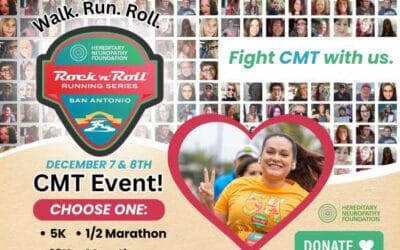
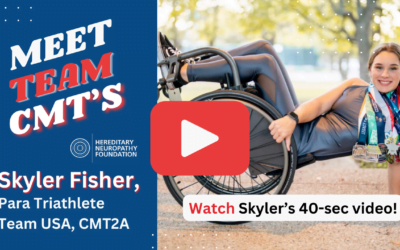

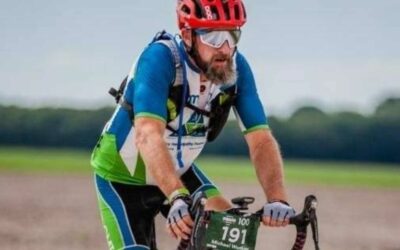
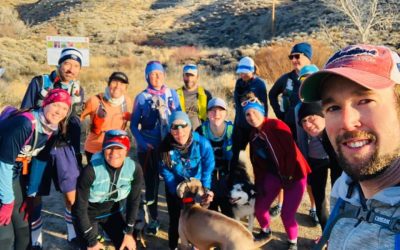

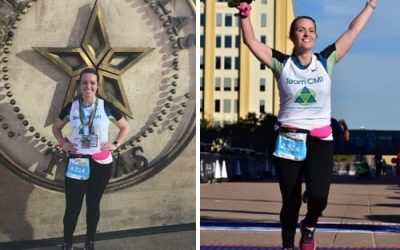


I also have C.M.T & run, just curious as to what your average mile time is.